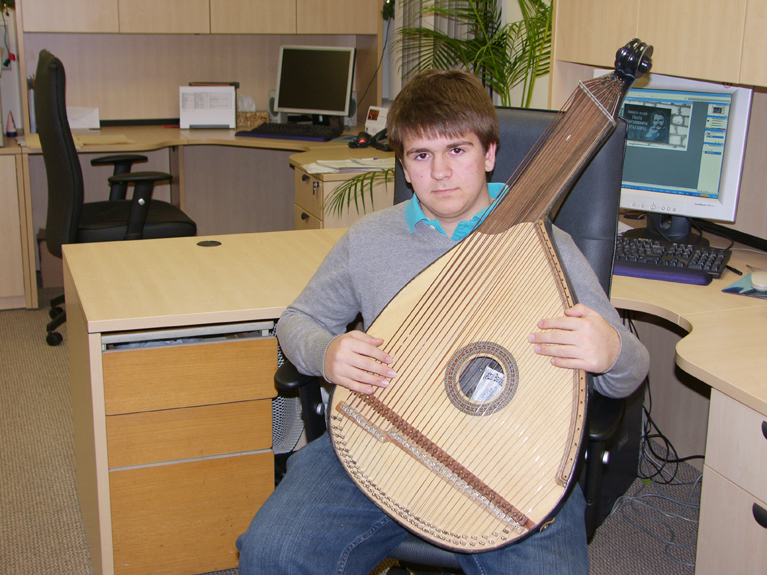
Young Canadian Bandurist Strums Success in
In early December, the New Pathway’s
John Pidkowich interviewed young Ukrainian Canadian bandura virtuoso Boris
Ostapenko, after competing in
John Pidkowich: For how many years you
have been playing the bandura ?
Boris Ostapienko:
I have been playing the bandura for eight years and have been taught by Dr.
Victor Mishalov for those eight years.
JP: Is the bandura your
first instrument?
BO:
The bandura is my second instrument after piano which is my first.
JP: How long have you
been playing the piano?
BO:
I have been playing the piano for roughly the same time, maybe for nine years.
JP: Is there a big
difference between the set-up and in playing these two instruments?
BO:
No, not really. The bandura is set up almost the same way as the piano, except
for missing two octaves. Aside from the sharps and the flats, the instruments
are almost the same. Except for the bandura which has the mechanisms, where you
have the semitone in the piano that does not exist between the B and the C, and
the E and the F, in the bandura between the E and the sharp of the E, you also
have an E, because when you change into another key, the sharp will become E
sharp which is F in minor keys or major keys with four sharps or more.
JP: Then, the bandura’s
semitone layout is similar to the keyboard’s, except for the string striking or
hammering motion?
BO:
Yes, on the piano you’re hammering and on the bandura your plucking the
string.
JP: How
long have you been with the Canadian Bandurist Capella?
BO:
I have been with the Capella since 2003 when I was ten-years old and still with
them today. I just turned 17.
JP: Have you been
preparing for competitions either with the Capella, in a group or on your own?
BO: For competitions, I’ve played by myself and
not with a group. I have performed in festivals and concerts on my own and
supposed to give recitals soon. I have played in the Toronto Kiwanis and
Ukrainian Music Festivals, as well as the Etobicoke Music Festival
JP: I understand that
recently you were competing internationally.
BO:
Yes, in
JP: Who were you
competing against, your peers?
BO:
My competitors were aged 20-25, some in their third or fourth year, or they
have finished the Conservatory. I was
the youngest competitor there.
JP: Did you perform
pieces already prepared in playing with the Capella or did you follow a
competition syllabus and prepare required pieces?
BO:
Yes, there was a competition syllabus offered. Two songs were required (prymusovi
tvory) to be performed, one as an entry song in the first round or “tour”,
a dance by Kharkiv composer M. Stetsoun and part of the basis for advancement
into the second round of competitions. The other requirements for the First
Tour were a prelude and fugue, for which I chose one in E Minor by
M. Dremliuha, and a contemporary piece by a 21st century composer, for which I
played “Vesnianka” by R. Hrynkiw. Once in the Third Tour, each
competitor was required to play a concerto by Y. Lapynskyi.
JP: How
did your fare?
BO:
I obtained two “diplomas” or certificates, one for being the best youngest
player and another for playing the best performance of a song by Hnat
Khotkevych, “The Slave Market in Kaffa”, since the competition is in his name.
In overall ranking, I placed fourth out of twelve in the bandura instrumental
player category. Other categories included bandura singer, tsymbaly player,
sopilka, etc. Six competitors then advanced to the Second Tour of
Bandura instrumentalists.
JP: What
did you perform in your Second Tour or round of competitions?
BO:
I played Beethoven’s “Moonlight Sonata”, Mendelssohn’s “Song without Words”,
and a variation on the theme of “Vzyav by ya banduru” by A. Mucha. These three
songs were played on a Chernihiv style bandura. The fourth song was the
mandatory concerto by Lapynskyi, played on a Kharkivs’ka Bandura.
JP: Aside
from the support of your family and Dr. Mishalov, did you receive other
support, financial or benefits from sponsors?
BO:
Yes, I thank my sponsors including James Temerty, the Ukrainian National
Federation of Canada – UNF Foundation, Ukrainian Credit Union, and
Canadian Bandurist Capella.
JP: How
did you find the Khotkevych Competition - “Konkurs” as a learning experience?
BO:
A great learning experience. I had the ability to practise for a very long time
because I was away from home and could focus just on the bandura. The amount of
talent and level of playing that I saw at the competition was large and very
high, as compared to the level played here in
JP: Are
you able to bring and share this gained knowledge in playing technique to the
Capella, and changing how you play with them?
BO:
My playing has not changed because of the set of pieces played by the Capella,
not being able to add new playing techniques, and also due to being limited to
playing on a Kharkivs’kyi Bandura.
JP: I’m
sure what you have learned will be used for challenges in the future and not to
be lost… Any further comments?
BO:
I again say that the competition was a great learning experience, meeting a lot
of young people. All I can add is the one thing that shocked me in
PHOTO
Ukrainian Canadian bandura virtuoso
Boris Ostapenko